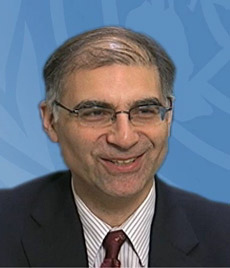|
Specialized Agencies and Related Organizations
International Financial Institutions
The Role of International and National
Environment Related Law in the World Bank
A. Legal Instruments
Articles of Agreement for the International Bank for Reconstruction and Development, Washington, 27 December 1945, United Nations, Treaty Series, vol. 2, p. 39.
International Convention for the Prevention of Pollution from Ships, London, 2 November 1973. Protocol of 1978 relating to the International Convention for the Prevention of Pollution from Ships, London, 17 February 1978, United Nations, Treaty Series, vol. 1340, p. 61. United Nations Framework Convention on Climate Change, New York, 9 May 1992, United Nations, Treaty Series, vol. 1771, p. 107. Convention on Biological Diversity, Rio de Janeiro, 5 June 1992, United Nations, Treaty Series, vol. 1760, p. 79. Kyoto Protocol to the United Nations Framework Convention on Climate Change, Kyoto, 11 December 1997, United Nations, Treaty Series, vol. 2303, p. 148. B. Documents
World Bank, Environmental Aspects of Bank Work, Operational Manual Statement 2.36, 1984.
World Bank, Environmental Assessment Policy, Operational Directive (OD) 4.01, 1989 (expanded in 1999). Agenda 21, United Nations Conference on Environment & Development, Rio de Janeiro, 3-14 June 1992. B. Morse, Th. R. Berger, Sardar Sarovar - Report of the Independent Review, Resource Futures International, Ottawa, 1992. International Bank for Reconstruction and Development/International Development Agency, Resolution No. IBRD 93-10/Resolution No. IDA 93-6 (“The World Bank Inspection Panel”), 22 September 1993. Millennium Ecosystem Assessment, 2005. Intergovernmental Panel on Climate Change, IPCC Fourth Assessment Report: Climate Change 2007 (AR4), Intergovernmental Panel on Climate Change, Geneva, 2007. Instrument for the Establishment of the Restructured Global Environment Facility, October 2011, Global Environmental Facility, Washington, 2011. C. Doctrine
J. W. Bruce, R. Giovarelli, L. Rolfes Jr., D. Bledsoe, R. Mitchell, Land Law Reform: Achieving Development Policy Objectives, Law, Justice and Development Series, World Bank, Washington D.C., 2006.
L. C. Christy, C. E. Di Leva, J. M. Lindsay, P. T. Takoukam, Forest Law and Sustainable Development: Addressing Contemporary Challenges Through Legal Reform, Law, Justice and Development Series, World Bank, Washington D.C., 2007. C. Di Leva, “Access to information, public participation, and conflict resolution at the World Bank”, in C. Bruch et al. (eds.), Public Participation in the Governance of International Freshwater Resources, United Nations University Press, New York, 2005, p. 199. C. Di Leva, “Helping to Achieve the Millennium Development Goals: Partnerships, Projects and Policies of the World Bank”, American Bar Association Journal of Energy, Environment and Natural Resources Section, 2004, p. 13. C. Di Leva, “International Environmental Law and Development”, Georgetown International Environmental Law Review, vol. 10, 1998, p. 501. C. Di Leva, “The Conservation of Nature and Natural Resources Through Market-Based Mechanisms and Legal Instruments”, Review of European Community and International Environmental Law, vol. 11, 2002, p. 84. C. Di Leva, S. Morita, “Maritime Rights of Coastal States and Climate Change: Should States Adapt to Submerged Boundaries?”, Law & Development Working Paper Series, no. 5, Legal Vice Presidency, World Bank, Washington, 2008. D. Freestone, E. Gudmundsdottir, W. Edeson, Legislating for Sustainable Fisheries: A Guide to Implementing the 1993 FAO Compliance Agreement and 1995 UN Fish Stocks Agreement, Law, Justice and Development Series, World Bank, Washington, 2001. F. J. Gonzales, S. M. A. Salman (eds.), Institutional Reform for Irrigation and Drainage: Proceedings of a World Bank Workshop, World Bank Technical Papers, no. 524, World Bank, Washington, 2002. K. Guernsey, M. Nicoli, A. Ninio, “Making Inclusion Operational: Legal and Institutional Resources for World Bank Staff on the Inclusion of Disability Issues in Investment Project”, Law & Development Working Paper Series, no. 1, Legal Vice Presidency, World Bank, Washington, 2006. J. Mercier, M. A. Bekhechi, The Legal and Regulatory Framework for Environmental Impact Assessments: A Study of Selected Countries in Sub-Saharan Africa, Law, Justice and Development Series, World Bank, Washington, 2002. K. K. Mwenda, Legal Aspects of Financial Services Regulation and the Concept of a Unified Regulator, Law, Justice and Development Series, World Bank, Washington, 2006. A. Palmieri, D. D. Bradlow, S. M. A. Salman, Regulatory Frameworks for Dam Safety: A Comparative Study, Law, Justice and Development Series, World Bank, Washington, 2002. S. M. A. Salman, The Legal Framework for Water Users’ Associations: A Comparative Study, World Bank Technical Papers, no. 360, World Bank, Washington, 1998. S. M. A. Salman (ed.), Groundwater: Legal and Policy Perspectives: Proceedings of a World Bank Seminar, World Bank Technical Papers, no. 456, World Bank, Washington, 1999. S. M. A. Salman (ed.), International Watercourses: Enhancing Cooperation and Managing Conflict, World Bank Technical Papers, no. 414, World Bank, Washington, 1999. S. M. A. Salman, D. D. Bradlow, Regulatory Frameworks for Water Resources Management: A Comparative Study, Law, Justice and Development Series, World Bank, Washington, 2006. S. M. A. Salman, S. McInerney-Lankford, The Human Right to Water: Legal and Policy Dimensions, Law, Justice and Development Series, World Bank, Washington, 2004. S. M. A. Salman, K. Uprety, Conflict and Cooperation on South Asia’s International Rivers, Law, Justice and Development Series, World Bank, Washington, 2003. K. Uprety, The Transit Regime for Landlocked States: International Law and Development Perspectives, Law, Justice and Development Series, World Bank, Washington, 2005. D. References
For more information from the World Bank on the Environment, see the official website.
For more information from the World Bank on Environmental and Natural Resources Law, see the official website. For the World Bank Safeguard Policies, see the official website. For the Equator Principles, see the official website of the Equator Principles Association. |

